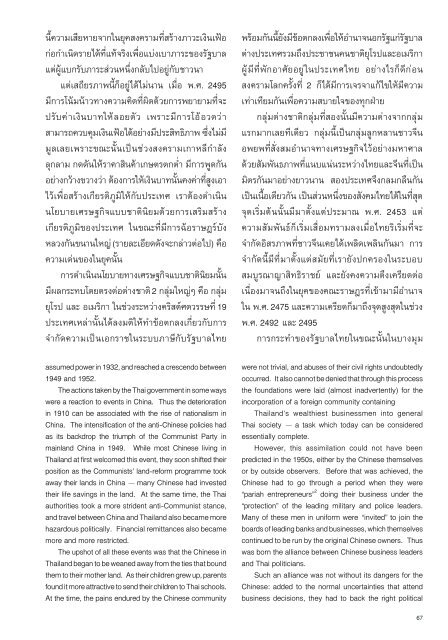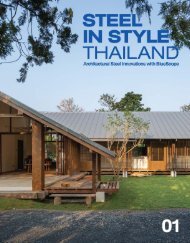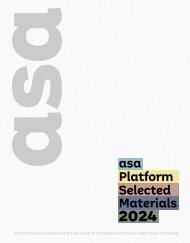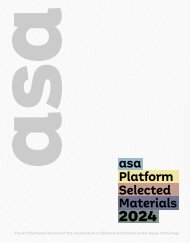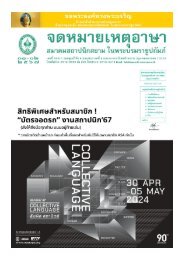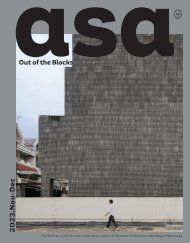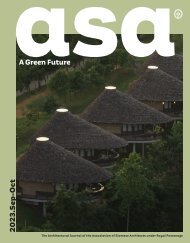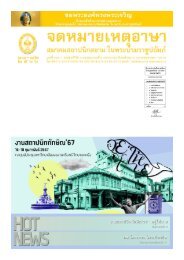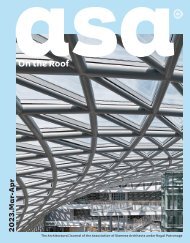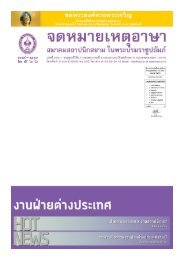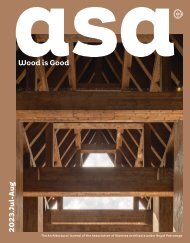บ้านเรือนถิ่นไทยในช่วงเจ็ดทศวรรษ 2489-2559
Create successful ePaper yourself
Turn your PDF publications into a flip-book with our unique Google optimized e-Paper software.
นี้ความเสียหายจากในยุคสงครามที่สร้างภาวะเงินเฟ้อ<br />
ก่อกำเนิดรายได้ที่แท้จริงเพื่อแบ่งเบาภาระของรัฐบาล<br />
แต่ผู้แบกรับภาระส่วนหนึ่งกลับไปอยู่กับชาวนา<br />
แต่เสถียรภาพนี้ก็อยู่ได้ไม่นาน เมื่อ พ.ศ. 2495<br />
มีการโน้มน้าวทางความคิดที่ผิดด้วยการพยายามที่จะ<br />
ปรับค่าเงินบาทให้ลอยตัว เพราะมีการโอ้อวดว่า<br />
สามารถควบคุมเงินเฟ้อได้อย่างมีประสิทธิภาพ ซึ่งไม่มี<br />
มูลเลยเพราะขณะนั้นเป็นช่วงสงครามเกาหลีกำลัง<br />
ลุกลาม กดดันให้ราคาสินค้าเกษตรตกต่ำ มีการพูดกัน<br />
อย่างกว้างขวางว่า ต้องการให้เงินบาทนั้นคงค่าที่สูงเอา<br />
ไว้เพื่อสร้างเกียรติภูมิให้กับประเทศ เราต้องดำเนิน<br />
นโยบายเศรษฐกิจแบบชาตินิยมด้วยการเสริมสร้าง<br />
เกียรติภูมิของประเทศ ในขณะที่มีการฉ้อราษฎร์บัง<br />
หลวงกันขนานใหญ่ (รายละเอียดดังจะกล่าวต่อไป) คือ<br />
ความเด่นของในยุคนั้น<br />
การดำเนินนโยบายทางเศรษฐกิจแบบชาตินิยมนั้น<br />
มีผลกระทบโดยตรงต่อต่างชาติ 2 กลุ่มใหญ่ๆ คือ กลุ่ม<br />
ยุโรป และ อเมริกา ในช่วงระหว่างคริสต์ศตวรรษที่ 19<br />
ประเทศเหล่านั้นได้ลงมติให้ทำข้อตกลงเกี่ยวกับการ<br />
จำกัดความเป็นเอกราชในระบบภาษีกับรัฐบาลไทย<br />
assumed power in 1932, and reached a crescendo between<br />
1949 and 1952.<br />
The actions taken by the Thai government in some ways<br />
were a reaction to events in China. Thus the deterioration<br />
in 1910 can be associated with the rise of nationalism in<br />
China. The intensification of the anti-Chinese policies had<br />
as its backdrop the triumph of the Communist Party in<br />
mainland China in 1949. While most Chinese living in<br />
Thailand at first welcomed this event, they soon shifted their<br />
position as the Communists’ land-reform programme took<br />
away their lands in China – many Chinese had invested<br />
their life savings in the land. At the same time, the Thai<br />
authorities took a more strident anti-Communist stance,<br />
and travel between China and Thailand also became more<br />
hazardous politically. Financial remittances also became<br />
more and more restricted.<br />
The upshot of all these events was that the Chinese in<br />
Thailand began to be weaned away from the ties that bound<br />
them to their mother land. As their children grew up, parents<br />
found it more attractive to send their children to Thai schools.<br />
At the time, the pains endured by the Chinese community<br />
พร้อมกันนี้ยังมีข้อตกลงเพื่อให้อ ำนาจนอกรัฐแก่รัฐบาล<br />
ต่างประเทศรวมถึงประชาชนคนชาติยุโรปและอเมริกา<br />
ผู้มีที่พักอาศัยอยู่ในประเทศไทย อย่างไรก็ดีก่อน<br />
สงครามโลกครั้งที่ 2 ก็ได้มีการเจรจาแก้ไขให้มีความ<br />
เท่าเทียมกันเพื่อความสบายใจของทุกฝ่าย<br />
กลุ่มต่างชาติกลุ่มที่สองนั้นมีความต่างจากกลุ่ม<br />
แรกมากเลยทีเดียว กลุ่มนี้เป็นกลุ่มลูกหลานชาวจีน<br />
อพยพที่สั่งสมอำนาจทางเศรษฐกิจไว้อย่างมหาศาล<br />
ด้วยสัมพันธภาพที่แนบแน่นระหว่างไทยและจีนที่เป็น<br />
มิตรกันมาอย่างยาวนาน สองประเทศจึงกลมกลืนกัน<br />
เป็นเนื้อเดียวกัน เป็นส่วนหนึ่งของสังคมไทยได้ในที่สุด<br />
จุดเริ่มต้นนั้นมีมาตั้งแต่ประมาณ พ.ศ. 2453 แต่<br />
ความสัมพันธ์ก็เริ่มเสื่อมทรามลงเมื่อไทยริเริ่มที่จะ<br />
จำกัดอิสรภาพที่ชาวจีนเคยได้เพลิดเพลินกันมา การ<br />
จำกัดนี้มีที่มาตั้งแต่สมัยที่เรายังปกครองในระบอบ<br />
สมบูรณาญาสิทธิราชย์ และยังคงความตึงเครียดต่อ<br />
เนื่องมาจนถึงในยุคของคณะราษฎรที่เข้ามามีอำนาจ<br />
ใน พ.ศ. 2475 และความเครียดก็มาถึงจุดสูงสุดในช่วง<br />
พ.ศ. 2492 และ 2495<br />
การกระทำของรัฐบาลไทยในขณะนั้นในบางมุม<br />
were not trivial, and abuses of their civil rights undoubtedly<br />
occurred. It also cannot be denied that through this process<br />
the foundations were laid (almost inadvertently) for the<br />
incorporation of a foreign community containing<br />
Thailand’s wealthiest businessmen into general<br />
Thai society – a task which today can be considered<br />
essentially complete.<br />
However, this assimilation could not have been<br />
predicted in the 1950s, either by the Chinese themselves<br />
or by outside observers. Before that was achieved, the<br />
Chinese had to go through a period when they were<br />
“pariah entrepreneurs” 2 doing their business under the<br />
“protection” of the leading military and police leaders.<br />
Many of these men in uniform were “invited” to join the<br />
boards of leading banks and businesses, which themselves<br />
continued to be run by the original Chinese owners. Thus<br />
was born the alliance between Chinese business leaders<br />
and Thai politicians.<br />
Such an alliance was not without its dangers for the<br />
Chinese: added to the normal uncertainties that attend<br />
business decisions, they had to back the right political<br />
67


